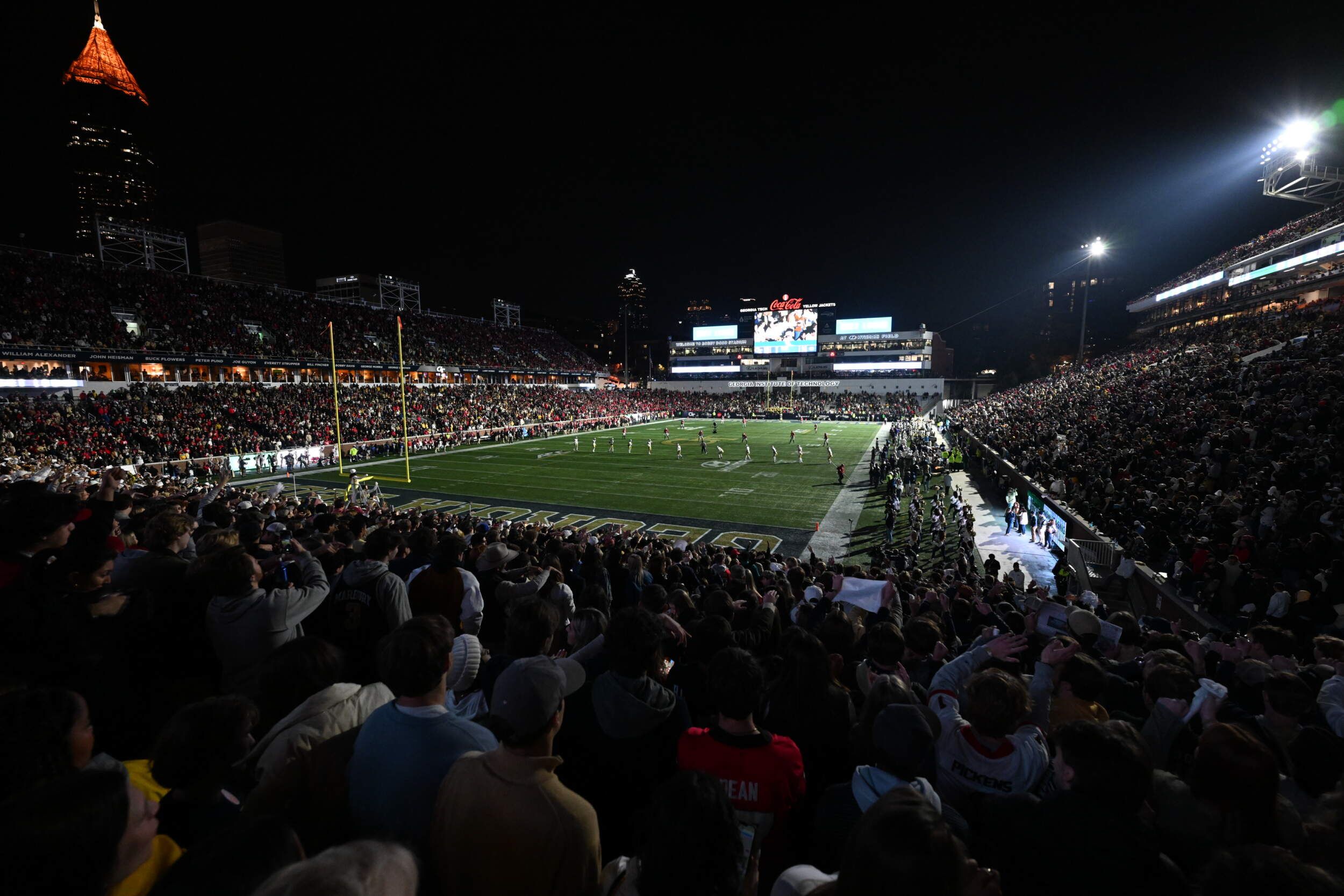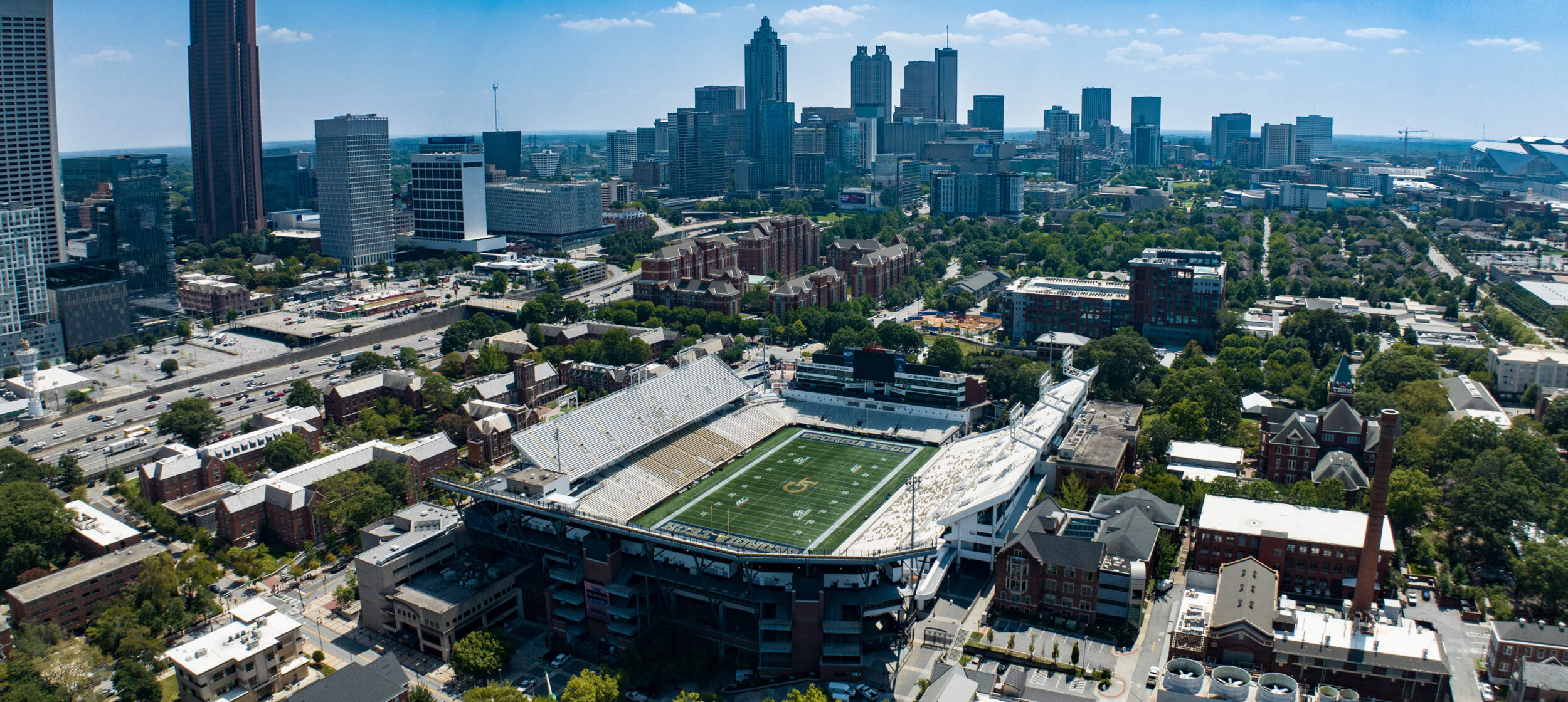Cozily nestled in the shadow of Atlanta’s skyline, Bobby Dodd Stadium at Hyundai Field is easily one of the nation’s most unique and historic settings for college football. The venerable facility — the oldest on-campus stadium in NCAA Division I FBS — opened in 1913 and 2023 will be its 111th season as the home of Georgia Tech football.
The Georgia Tech students who built the stadium more than 100 years ago wouldn’t recognize the home of Tech football if they saw it now. Not only has the skyline around the stadium changed dramatically, but the facility has steadily grown and improved during its rich history. Today’s Bobby Dodd Stadium seats 55,000 fans in a modern, comfortable facility that embraces the tradition that has made Tech’s venerable stadium a cornerstone of college football for more than a century. It is located in the heart of Georgia Tech’s midtown Atlanta campus, bordered by Techwood Drive on the east, North Avenue on the south and Bobby Dodd Way on the north.
Tech actually began playing football on the site in 1905, but in 1913, the original concrete west stands were largely built by Tech students and seated 5,600. The concrete east stands were completed in time for the 1924 season. A year later, the south stands were finished, bringing the seating capacity of the horseshoe-shaped stadium to approximately 30,000. The west stands were rebuilt in 1944 to up capacity to 44,000, followed by the addition of stands in the north end zone in 1958 and upper decks on the east (1962) and west sides (1968), which brought the stadium’s capacity to an all-time high of 58,121. Stadium capacity dipped to 46,000 in 1985 following the removal of seats in the south end zone to make way for the Wardlaw Center, but after a major renovation project from 2001-03, which included bowling in and adding an upper deck to the north end of the facility, capacity moved to its current 55,000.
While capacity has remained the same since 2003, Georgia Tech continues to make improvements to Bobby Dodd Stadium on a yearly basis. Most recently, the stadium underwent a series of major upgrades in 2020, which included:

Georgia Tech’s football facility was known as Grant Field until April 1988, when the Georgia State Board of Regents voted to add the name Bobby Dodd Stadium in honor of the legendary coach who guided the Ramblin’ Wreck to its most illustrious football era. A member of the National Football Foundation College Football Hall of Fame, Dodd compiled a 165-64-8 record from 1945-66, and tutored 21 all-Americans as he led Tech to 13 bowl trips during his 22-year stay as head coach. Dodd served as Tech’s director of athletics from 1951-76 and then worked as a consultant for the alumni association until his death in 1988 following a 57-year association with the Institute.
In August 2023, the name of the facility became Bobby Dodd Stadium at Hyundai Field, as part of a multi-decade partnership between Georgia Tech and Hyundai.
The stadium was originally named Hugh Inman Grant Field in 1914 after a gift from John W. Grant, a member of the Tech Board of Trustees and a well-known Atlanta merchant. The Grant family gave the initial $15,000 used in 1913 to build the first permanent concrete stands on the west side of the field. In gratitude for the gift, the Board of Trustees named the field Hugh Inman Grant Field in memory of Grant’s deceased son.
In the 110 autumns since it was erected, legends from Clint Castleberry to George Morris to Joe Hamilton to Calvin Johnson have called the storied venue home. Tech alumnus Brent Key joins coaching giants such as John Heisman, William Alexander and Bobby Dodd that have patrolled the sidelines. In all, four national-title teams (1917, 1928, 1952 and 1990) and 15 conference champions have showcased their skills on The Flats. The stadium has also been the site of one of the most notorious games ever played, Tech’s 222-0 win over Cumberland in 1916. The facility has hosted numerous crowds that have exceeded its official seating capacity, the largest of which was the 60,316 spectators for the Georgia game in 1973.

Not only has Bobby Dodd Stadium been the site of legendary football games, the facility has also hosted major special events. In 1935, a standing-room only crowd of more than 50,000 packed the stands to listen to a speech from Franklin Delano Roosevelt. Nelson Mandela gave a speech in the stadium in 1990 after being released from prison. In June 2015, Bobby Dodd Stadium hosted The Rolling Stones during their ZIP CODE Tour. It was the Stones’ second concert at Bobby Dodd Stadium (1989). Other artists to perform at Bobby Dodd Stadium include Yes (1974), Bob Seger & the Silver Bullet Band (1977), Heart (1977), Cheap Trick (1977), Foreigner (1977), The Doobie Brothers (1978), Aerosmith (1979), Simon & Garfunkel (1983), New Kids On The Block (1990), and Jimmy Buffett (1993). Sold-out shows by BTS and Guns N’ Roses were scheduled to return Bobby Dodd Stadium to one of the Southeast’s premier concert venues in 2020, but were canceled due to the Covid-19 pandemic.
In addition to major speeches and concerts, Bobby Dodd Stadium has also been the site of significant non-Georgia Tech sporting events. Most notably, it served as a practice facility for athletes during the 1996 Summer Olympics in Atlanta. It also served as the home of the Peach Bowl from 1968-70, the Atlanta Apollos of the North American Soccer League in 1973 and the Atlanta Beat of the Women’s United Soccer Association in 2001. Most recently, Bobby Dodd Stadium hosted sellout crowds for the first nine home matches in the history of Major League Soccer’s Atlanta United in 2017.